Outline of Canada
The following outline is provided as an overview of and topical guide to Canada:
.svg.png.webp)
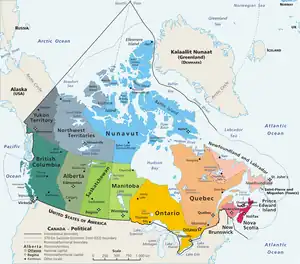
Canada (/ˈkænədə/) is a North American country consisting of ten provinces and three territories. Located in the northern part of the continent, it extends from the Atlantic Ocean in the east to the Pacific Ocean in the west and northward into the Arctic Ocean.[1] It is the world's second largest country by total area, and shares land borders with the United States to the south and northwest, and marine borders with France and Greenland on the east and northeast, respectively.
The lands have been inhabited for millennia by various groups of aboriginal peoples. Beginning in the late 15th century, British and French expeditions explored and later settled the Atlantic coast. France ceded nearly all of its colonies in North America in 1763 after the Seven Years' War. In 1867, with the union of three British North American colonies through Confederation, Canada was formed as a federal dominion of four provinces.[2][3][4] This began an accretion of additional provinces and territories and a process of increasing autonomy from the United Kingdom, highlighted by the Statute of Westminster in 1931 and culminating in the Canada Act in 1982 which severed the vestiges of legal dependence on the British parliament.
Canada is a federation that is governed as a parliamentary democracy and a constitutional monarchy with King Charles III as its head of state. It is a bilingual and multicultural country, with both English and French as official languages at the federal level. Technologically advanced and industrialized, Canada maintains a diversified economy that is heavily reliant upon its abundant natural resources and upon trade—particularly with the United States, with which Canada has a long and complex relationship.
General reference
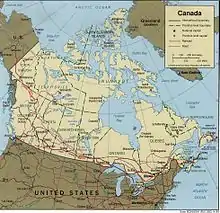
- Pronunciation /ˈkænədə/
- Common English country name: Canada
- Official English country name: Canada
- Common endonym: Canada
- Official endonym: Canada
- Adjectival: Canadian, Canada
- Demonym: Canadian (Fr. canadien)
- Etymology: Name of Canada
- ISO country codes: CA, CAN, 124
- ISO region codes: See ISO 3166-2:CA
- Internet country code top-level domain: .ca
- International rankings of Canada
Geography
- Canada is...
- Location:
- Northern Hemisphere, Western Hemisphere
- Time zones (Time in Canada):
- Newfoundland Standard Time (UTC-03:30), Newfoundland Daylight Time (UTC-02:30)
- Atlantic Standard Time (UTC-04), Atlantic Daylight Time (UTC-03)
- Eastern Standard Time (UTC-05), Eastern Daylight Time (UTC-04)
- Central Standard Time (UTC-06), Central Daylight Time (UTC-05)
- Mountain Standard Time (UTC-07), Mountain Daylight Time (UTC-06)
- Pacific Standard Time (UTC-08), Pacific Daylight Time (UTC-07)
- Extreme points of Canada
- North: Cape Columbia, Nunavut - (83°08' N, 74°13'W)
- South: Middle Island, Ontario - (41°41'N, 82°40'W)
- East: Cape Spear, Newfoundland - (47°31'N, 52°37'W)
- West: Yukon-Alaska border - (141°00'W)
- High: Mount Logan, Yukon 5,959 m (19,551 ft)
- Low: North Atlantic Ocean, Arctic Ocean, and North Pacific Ocean 0 m
- Land boundaries:
 United States 8,893 km (5,526 miles)[5]
United States 8,893 km (5,526 miles)[5]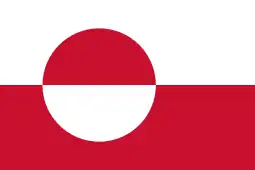 Greenland 1,280 m (4,200 feet) (on Hans Island)
Greenland 1,280 m (4,200 feet) (on Hans Island)
- Coastline: 202,080 km (125,570 miles)[6]
- Population of Canada: 36,991,981 people (2021 Census[7]) - 37th most populous country
- Area of Canada: 9,984,670 km2 (3,855,100 square miles) - 2nd most extensive country
- Atlas of Canada
Environment
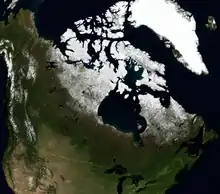
Geographic features
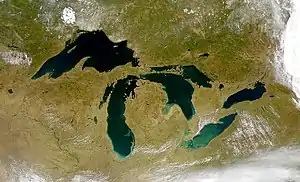
Regions
Other regions
- English Canada, sometimes known as the Rest of Canada (excluding Quebec) when considering topics of language
- French Canada
- Acadia
- Quebec-Windsor Corridor
Ecoregions
Provinces and territories
Provinces
| Province, with flag | Postal abbreviation/ ISO code |
Other abbreviations | Capital | Entered Confederation | Population (2016)[8] |
Area (km2) | ||
|---|---|---|---|---|---|---|---|---|
| Land | Water | Total | ||||||
| ON | Ont. | Toronto | July 1, 1867 | 13,448,494 | 917,741 | 158,654 | 1,076,395 | |
| QC | Que., PQ, P.Q. | Quebec City | 8,164,361 | 1,356,128 | 185,928 | 1,542,056 | ||
| NS | N.S. | Halifax | 923,598 | 53,338 | 1,946 | 55,284 | ||
| NB | N.B. | Fredericton | 747,101 | 71,450 | 1,458 | 72,908 | ||
| MB | Man. | Winnipeg | July 15, 1870 | 1,278,365 | 553,556 | 94,241 | 647,797 | |
| BC | B.C. | Victoria | July 20, 1871 | 4,648,055 | 925,186 | 19,549 | 944,735 | |
| PE | PEI, P.E.I., P.E. Island | Charlottetown | July 1, 1873 | 142,907 | 5,660 | — | 5,660 | |
| SK | Sask., SK, SKWN | Regina | September 1, 1905 | 1,098,352 | 591,670 | 59,366 | 651,036 | |
| AB | Alta. | Edmonton | 4,067,175 | 642,317 | 19,531 | 661,848 | ||
| NL | Nfld., NF, LB | St. John's | March 31, 1949 | 519,716 | 373,872 | 31,340 | 405,212 | |
Notes:
- Immediately prior to Confederation, Ontario and Quebec were part of the Province of Canada.
- Nova Scotia, New Brunswick, British Columbia, and Prince Edward Island were separate colonies at the time of joining Canada.
- Manitoba was established simultaneously with Northwest Territories.
- Saskatchewan and Alberta were created out of land that had been part of Northwest Territories.
- Prior to its entry in Confederation, Newfoundland had been a Dominion within the British Commonwealth, but due to a financial crisis during the Depression had surrendered its right to self-government and was under direct British governance.
Territories
There are currently three territories in Canada. Unlike the provinces, the territories of Canada have no inherent jurisdiction and only have those powers delegated to them by the federal government.
| Territory, with flag | Postal abbreviation/ ISO code |
Other abbreviations | Capital | Entered Confederation | Population (2007)[8] |
Area (km2) | ||
|---|---|---|---|---|---|---|---|---|
| Land | Water | Total | ||||||
| NT | N.W.T., NWT | Yellowknife | July 15, 1870 | 41,786 | 1,183,085 | 163,021 | 1,346,106 | |
| YT | Y.T., YK | Whitehorse | June 13, 1898 | 35,874 | 474,391 | 8,052 | 482,443 | |
| NU | NV | Iqaluit | April 1, 1999 | 35,944 | 1,936,113 | 157,077 | 2,093,190 | |
Note: Canada did not acquire any new land to create Yukon, Alberta, Saskatchewan, or Nunavut. All of these originally formed part of Northwest Territories.
Municipalities
Government and politics
 |
|---|
- Form of government: constitutional monarchy and democratic parliamentary federation
- Capital of Canada: Ottawa
- Provinces and territories of Canada
- Canadian and American politics compared
- Canadian and Australian politics compared
- Canadian Conservatism
- List of Canadian federal general elections
- Canadian Nationalism
- Elections in Canada
- Federalism in Canada
- Human rights in Canada
- Liberalism in Canada
- Political culture of Canada
- Political parties in Canada
- Political scandals of Canada
- Progressivism in Canada
- Socialism and Social Democracy in Canada
- Taxation in Canada
Branches of the government
Executive branch of the government
| Monarchy of Canada |
|---|
 |
| This article is part of a series |
Legislative branch of the government
Judicial branch of the government
| Supreme Court of Canada |
|---|
 |
| The Court |
| Current members |
|
|
| All members |
| Related |
|
Court system of Canada Judicial appointments in Canada |
- Supreme Court of Canada
- Appellate Courts of the provinces and territories
- Alberta Court of Appeal
- British Columbia Court of Appeal
- Manitoba Court of Appeal
- New Brunswick Court of Appeal
- Court of Appeal of Newfoundland and Labrador
- Court of Appeal for the Northwest Territories
- Nova Scotia Court of Appeal
- Nunavut Court of Appeal
- Court of Appeal for Ontario
- Court of Appeal of Prince Edward Island
- Quebec Court of Appeal
- Saskatchewan Court of Appeal
- Court of Appeal of the Yukon Territory
- Superior-level trial courts of the provinces and territories
- Court of King's Bench of Alberta
- Supreme Court of British Columbia
- Court of King's Bench of Manitoba
- Court of King's Bench of New Brunswick
- Supreme Court of Newfoundland and Labrador
- Supreme Court of the Northwest Territories
- Supreme Court of Nova Scotia
- Nunavut Court of Justice
- Ontario Superior Court of Justice
- Supreme Court of Prince Edward Island
- Quebec Superior Court
- Court of King's Bench for Saskatchewan
- Supreme Court of the Yukon Territory
Foreign relations
International organization membership
Canada is a member of:[1]
Legal system
| Part of a series on |
| Canadian law |
|---|
 |
| Sources |
|
| Core areas |
| Other areas |
| Courts |
| Education |
Military
- Command structure
- Commander-in-chief: Governor General of Canada (nominally, see also The Canadian Crown and the Canadian Forces)
- Prime Minister of Canada (de facto Commander-in-chief)
- Minister of National Defence
- Chief of the Defence Staff
- Royal Canadian Navy (RCN), command of the Navy;
- Canadian Army (CA) command of the Army;
- Royal Canadian Air Force (RCAF), command of the Air Force.
- Canadian Joint Operations Command (CJOC), responsible for all operations except special forces;
- Canadian Special Operations Forces Command (CANSOFCOM), responsible for special forces operations within Canada and abroad.
- Chief of the Defence Staff
- Minister of National Defence
- Canadian Forces
- Army: Canadian Army
- Navy: Royal Canadian Navy
- Air force: Royal Canadian Air Force
- Special forces: Canadian Special Operations Forces Command
- Military reserve force: Canadian Forces reserve force
- Canadian Coast Guard
Provincial governments
Territory governments
History
| Part of a series on the |
| History of Canada |
|---|
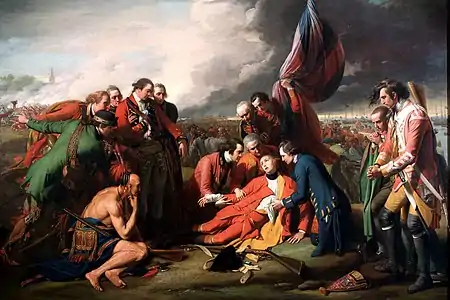 |
| Timeline (list) |
| Historically significant |
| Topics |
| By provinces and territories |
| Cities |
| Research |
- Former Colonies and Territories in Canada
- Constitutional history of Canada
- History of immigration to Canada
- Economic history of Canada
- Fires in Canada
- Military history of Canada
- History of monarchy in Canada
- Persons of National Historic Significance
- Territorial evolution of Canada (1867–present)
History of Canada by period
Culture
| Part of a series on the |
| Culture of Canada |
|---|
| History |
| Topics |
| Research |
- Age and internet use in Canada
- Alcoholic beverages in Canada
- Architecture of Canada
- Cuisine of Canada
- Decorations and medals of Canada (in order of precedence)
- Festivals in Canada
- Humour in Canada
- Languages of Canada
- Media in Canada
- Symbols of Canada
- Canadians
- Prostitution in Canada
- Public holidays in Canada
- World Heritage Sites in Canada
Provinces
Territories
- Culture of Northwest Territories
- Culture of Nunavut
- Culture of the Yukon
Art in Canada
Music
 | ||||||||
| Music of Canada | ||||||||
| Genres | ||||||||
|---|---|---|---|---|---|---|---|---|
| Specific forms | ||||||||
|
||||||||
| Media and performance | ||||||||
|
||||||||
| Nationalistic and patriotic songs | ||||||||
|
||||||||
| Regional music | ||||||||
Provinces
Religion in Canada
Sport in Canada
Sport in Canada Official Sports
Other sports
- Canadian football
- Canada at the Olympics
- Canada Rugby League
- Canadian Curling Association
- Canadian Figure Skating
- Association Football (Soccer) in Canada
- Cross Country Skiing
- Snowboarding in Canada
Hall of Fame Museums
Economy and infrastructure
| Part of a series on the |
| Economy of Canada |
|---|
 |
| Economic history of Canada |
| Sectors |
|
| Economy by province |
| Economy by city |
- Economic rank, by nominal GDP (2007): 9th (ninth)
- Agriculture in Canada
- Banking in Canada
- Communications in Canada
- Companies of Canada
- List of convention and exhibition centres
- Currency of Canada: Dollar
- Economic history of Canada
- Energy in Canada
- Health care in Canada
- Mining in Canada
- Science and technology in Canada
- Stock exchanges:
- CNQ
- Nasdaq Canada
- Toronto Stock Exchange, S&P/TSX 60 is the main index of TSX
- TSX Venture Exchange
- Winnipeg Commodity Exchange
- Montreal Exchange
Provinces
Education in Canada
Provinces
Territories
- Education in Northwest Territories
- Education in Nunavut
- Education in the Yukon
Bibliographies
See also
- All pages with titles beginning with Canada
- All pages with titles beginning with Canadian
- All pages with titles containing Canada
- All pages with titles containing Canadian
- List of international rankings
- Member state of the Commonwealth of Nations
- Member state of the Group of Twenty Finance Ministers and Central Bank Governors
- Member state of the North Atlantic Treaty Organization
- Member state of the United Nations
- Metrication in Canada
References
- "Canada". The World Factbook. United States Central Intelligence Agency. July 8, 2009. Retrieved July 23, 2009.
- "Territorial evolution". Atlas of Canada. Natural Resources Canada. Archived from the original on 2007-08-09. Retrieved 2007-10-09.
In 1867, the colonies of Canada, Nova Scotia and New Brunswick are united in a federal state, the Dominion of Canada....
- "Canada: History". Country Profiles. Commonwealth Secretariat. Archived from the original on 2007-10-12. Retrieved 2007-10-09.
The British North America Act of 1867 brought together four British colonies ... in one federal Dominion under the name of Canada.
- Hillmer, Norman; W. David MacIntyre. "Commonwealth". Canadian Encyclopedia. Historica Project. Retrieved 2007-10-09.
With CONFEDERATION in 1867, Canada became the first federation in the British Empire ...
- The total length of the land border between Canada and the United States is the longest between any two countries.
- The coastline of Canada is the longest in the world. The total length of the coast of Canada is more than five times as long as the circumference of the Earth.
- Government of Canada, Statistics Canada (December 15, 2022). "Census Profile, 2021 Census - Canada [Country]". www12.statcan.gc.ca. Retrieved January 24, 2023.
- "Population and dwelling counts, for Canada, provinces and territories, 2016 and 2011 censuses – 100% data". Statistics Canada. Retrieved July 17, 2020.
External links
- Government
- Official website of the Government of Canada
- Official website of the Prime Minister of Canada
- Official website of the Governor General of Canada
- Official website of the Canadian Forces
- Official Government of Canada online Atlas of Canada
- Canada and the United Nations
- Crown corporations
- Other
- Culture.ca — Canada's Cultural Gateway
- Culturescope.ca — Canadian Cultural Observatory
- Canadian Studies: A Guide to the Sources
- Statistics Canada with Canada's population clock
- The Canadian Atlas Online
- Canada. The World Factbook. Central Intelligence Agency.
- UN Human Development Program: Country Fact Sheet: Canada (link broken), Statistics — Country Sheet: Canada
 Canada travel guide from Wikivoyage
Canada travel guide from Wikivoyage- Canada from The Canadian Encyclopedia
.svg.png.webp)
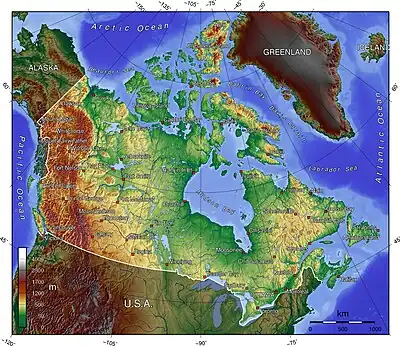
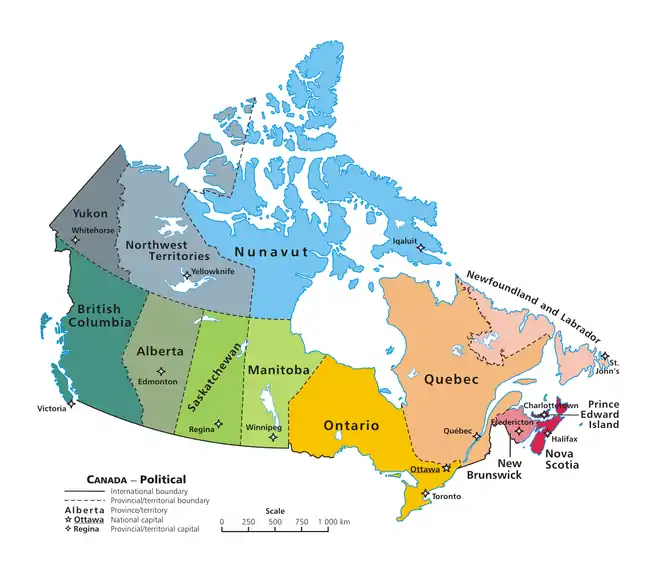

.svg.png.webp)